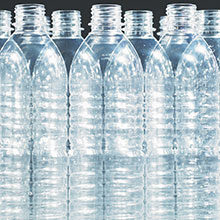Plastic waste: a global challenge and an opportunity for microbiology
10 April 2018

Bacteria can be used to convert plastic waste into biodegradable polymers, researchers say. Today, at the Microbiology Society’s Annual Conference in Birmingham, Professor Kevin O’Connor, a leading principal investigator at University College Dublin, will discuss strategies to reduce plastic waste.
As plastic waste continues to accumulate in oceans and harm marine life, plastic recycling rates remain low. Recycled plastics struggle to compete with the price and quality of the virgin equivalent, and pressure on governments and policymakers to reduce plastic waste is increasing.
Professor O’Connor and Dr Tanja Narancic are currently developing technologies which could open up new recycling opportunities and reduce plastic pollution. Their research, conducted at the Beacon Science Foundation Ireland (SFI) Bioeconomy Research Centre, combines chemical and microbiological technologies to convert waste to value added products such as biodegradable plastics.
Biodegradable plastics are broken down by bacteria in the environment. In some environments, such as oceans, there are not enough bacteria and temperatures are low. As a result, the breakdown process is slower. The ideal environment for the degradation is in a compost condition, thus, to minimize pollution, disposal of biodegradable plastics must still be carefully managed.
In January 2018, The European Commission published a strategy which seeks cost effective, reusable or recyclable plastic packaging by 2030 in line with the UN’s Sustainable Development Goals (SDG) agenda. This is a goal Professor O’Connor believes is achievable: “It is absolutely feasible to replace petrochemical plastic with bio-based and biodegradable plastics.”
There are currently many biodegradable and bio-based plastics available on the market, but their uptake requires the investment of government and industry.
Professor O’Connor’s talk takes place today at the Microbiology Society Annual Conference at 9:20 in Hall 1.
As plastic waste continues to accumulate in oceans and harm marine life, plastic recycling rates remain low. Recycled plastics struggle to compete with the price and quality of the virgin equivalent and pressure on governments and policymakers to reduce plastic waste is increasing.
Professor O’Connor and Dr Tanja Narancic are currently developing technologies which could open up new recycling opportunities and reduce plastic pollution. Their research, conducted at the Beacon Science Foundation Ireland (SFI) Bioeconomy Research Centre, combines chemical and microbiological technologies to convert wastes to value added products such as biodegradable plastics.
Biodegradable plastics are broken down by bacteria in the environment. In some environments, such as oceans, there are not enough bacteria and temperatures are low, which slows the breakdown process. The ideal environment for the degradation is in a compost condition, thus, to minimize pollution, disposal of biodegradable plastics must still be carefully managed.
In January 2018, The European Commission published a strategy which seeks cost effective, reusable or recyclable plastic packaging by 2030, in line with the UN’s Sustainable Development Goals (SDG) agenda, – a goal Professor O’Connor believes is achievable: “It is absolutely feasible to replace petrochemical plastic with bio-based and biodegradable plastics.”
There are currently many biodegradable and bio-based plastics available on the market, but their uptake requires the investment of government and industry.
This talk takes place today at the Microbiology Society Annual Conference at 9:20 in Hall 1.
